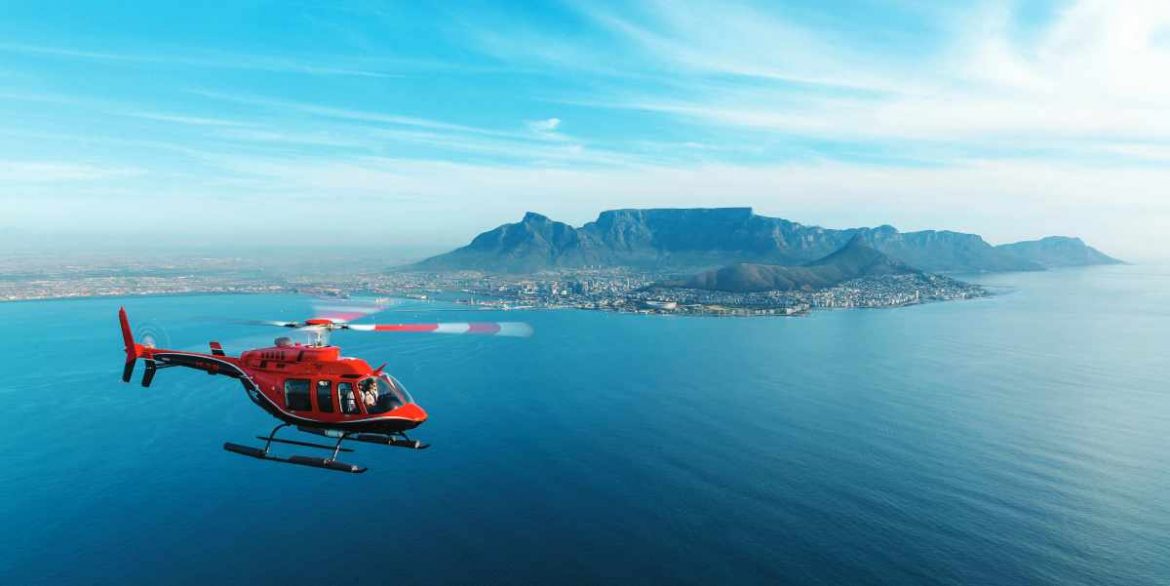South Africa is a gloriously beautiful country, blessed with variety in scenery and citizenry.
My body is buzzing as I touch ground in South Africa for the first time. I’m sure the sleep deprivation and on-board mimosas are contributing factors, but I feel uncharacteristically emotional and oddly connected to this new place already. Maybe it’s because this is the Mother Land for us all, where anthropologists have traced the first ever humans. Maybe it’s because I am anticipating the repeated “once-in-a-lifetime” experiences I will have over the next two weeks.
South Africa is a gloriously beautiful country, blessed with variety in scenery and citizenry. The country’s topography includes mountains, coastlines, arid savannahs, and subtropical wetlands, all in an area about double the size of Texas. But the country’s merits extend far beyond its geographical gifts.
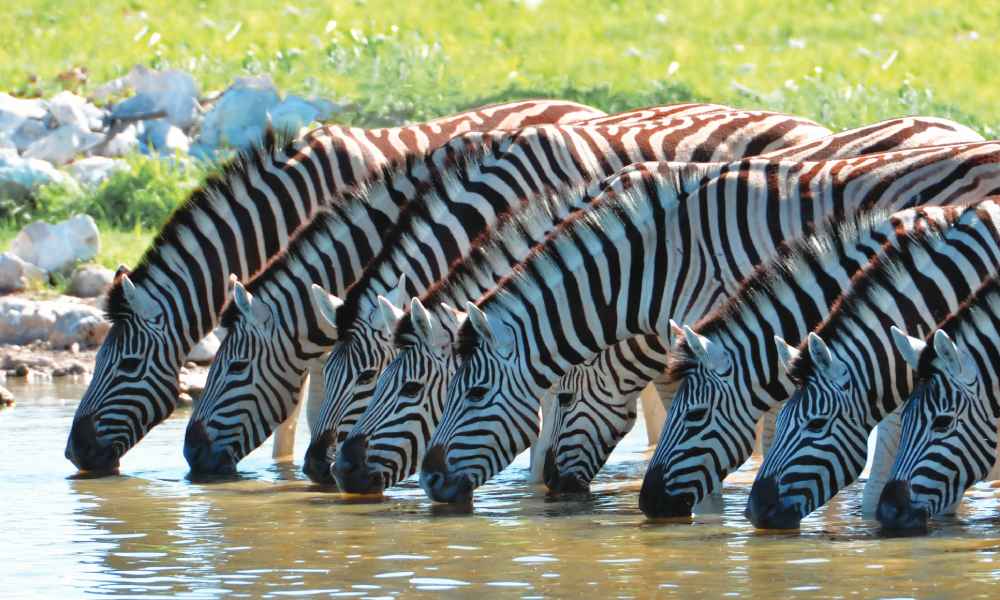
Zebras Enjoying a Drink (Photo by Gudkov Andrey
As I prepare to begin my tour of multiple regions, I realize that less than 30 years after abolishing apartheid, decriminalizing homosexuality, and acknowledging the country’s multiculturalism by naming 11 official languages, the people of South Africa, resplendent, diverse, welcoming, and proud, remain the country’s greatest resource.
I arrive in Johannesburg 30 hours later than planned, due to the cancellation of my direct flight from Newark and a rerouting through Europe, but I make it just in time to see my first South African “sundowner” from the rooftop bar of the Radisson RED Johannesburg Rosebank (4 Parks Blvd. Tel: +27-10-023-3580. radissonhotels.com). And I tell you, it is just as glorious as you would expect: shades of orange and yellow engulfing the early evening sky with a filter only Mother Nature can create.
DURBAN
The next morning I am off to Durban, South Africa’s third largest city. Durban sits on the Indian Ocean in the province of KwaZulu-Natal and welcomes beachgoers to the country’s longest seaside promenade, with warm weather year-round. The city is also home to one of the largest Indian populations outside of India, many of whose ancestors were brought to South Africa as indentured laborers in the 19th century. This cohabiting of Indian and South African cultures is uniquely Durban and doesn’t exist the same way anywhere else in the world.
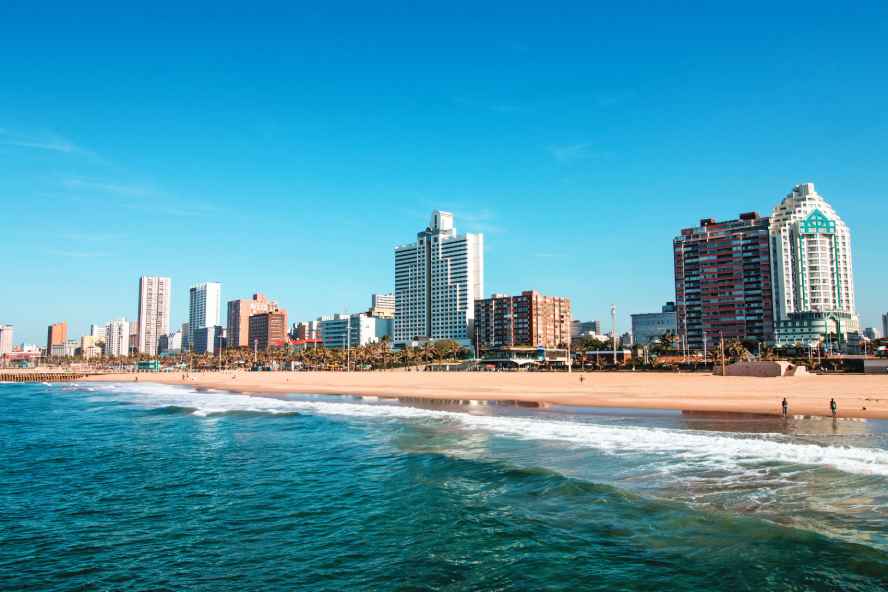

Durban Beach (Photo by South Africa Tourism)
Bunny chow, a curry dish served in a hollowed-out bread bowl, is the quintessential Durban meal and features prominently on practically every restaurant menu. And don’t worry, no bunnies were harmed in the making of this meal. The filling is usually lamb, chicken, or veggie curry, and the bread casing was created for easy transport, at a time before to-go containers.
From my Durban base I set out on a day trip guided by the fabulous Thoko Jili (www.facebook.com/thoko.jili) to learn about two titans of progressive change: Mahatma Gandhi and Nelson Mandela.
In 1893, at the Pietermaritzburg, KwaZulu-Natal train station, a young Gandhi was forcibly removed because he refused to move from the first-class cabin, for which he had purchased a ticket. This moment ignited his fight against social injustice and helped shape his satyagraha philosophy of nonviolent political resistance, a philosophy that would later have a profound effect on the fight against apartheid.
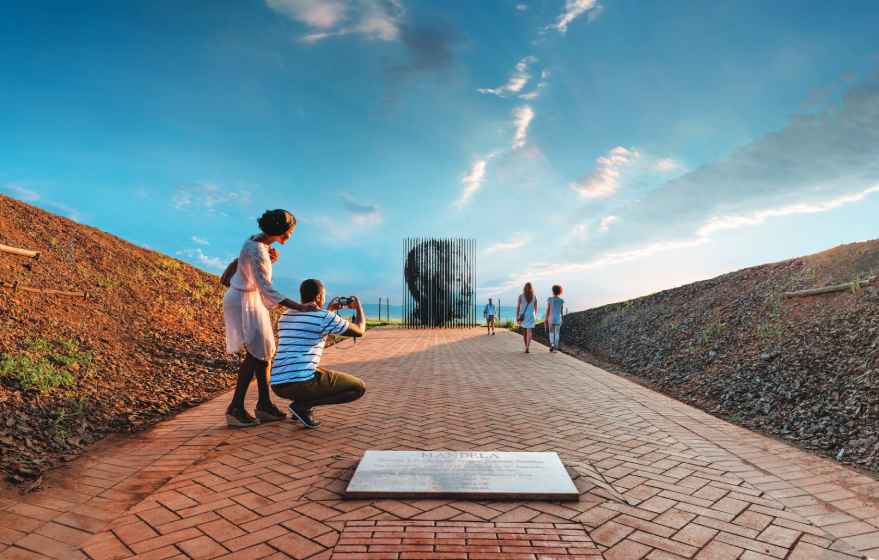

Nelson Mandela Capture Site (Photo courtesy of South Africa Tourism)
We all talk about bucket list items and once-in-a-lifetime trips. South Africa is both of these things, and I seriously hope this experience is one I’m able to repeat.
From here I continue to the Nelson Mandela Capture Site (R103, Howick. Tel: +27-72-351-0967. thecapturesite.co.za), the spot where Mandela was arrested in 1962, leading to his trial and eventual 27 years of incarceration. Today, the site is home to a sculpture by Marco Cianfanelli that reveals the face of Nelson Mandela, as we take a figurative “long walk to freedom” in his footsteps. It’s an artistically gorgeous tribute to the man who continues to be the image of modern South Africa, almost a decade after his death in 2013. The site is also a museum that tells the complex story behind the man: from his ancestry to his rise as the country’s first democratically elected president. In the process, I learn the car that Mandela was driving when captured (which is prominently displayed in the museum) was loaned to him by Cecil Williams, a gay man who fought against apartheid laws forbidding cross-racial relationships and criminalizing homosexuality.
While on the topic of homosexuality, the scene in Durban is small but friendly. According to Jason Fiddler, the chair of the KwaZuluNatal Gay and Lesbian Tourism Association (kzngalta.org.za) and founder of the Durban Gay and Lesbian Film Festival (facebook.com/DGLFF), Durban is generally a conservative city, but one that younger generations are repositioning as more inclusive.
Club Altitude, also called Backstage@226 (226 Mathews Meyiwa Rd. Tel: +27-64-476-9533. clubaltitude.co.za), is currently the only LGBTQ-identifying bar. I visit on a Sunday night and though the crowd is sparse, it doesn’t take long to meet friendly locals, like Lagan and Kenny.
From them I learn that Durban gay male culture is very much on the down-low, as is also confirmed by the faceless profiles on the various apps. Lagan is the owner of Cine-X (16 Woodford Grove. Tel: +27-64-842-7061), a “gay-friendly” adult bookstore with darkrooms and hook up spaces. Even though it is gay-owned, Lagan explains the store is not labeled as gay-specific because many of the men who frequent the store to have sex with other men, do not self-identify as gay. Should that be your jam, Cine-X is busiest during the day and they have different themed events throughout the week.
As the night progresses, Club Altitude begins to feel like a familiar neighborhood bar I have visited for years. Neither fancy nor pretentious, our eventual dance party reminds me of joyous, easier times, when all we needed was an iPod Shuffle, a few beers, and the company of good friends.
SOUTH AFRICAN SAFARI
No first trip to South Africa would be complete without a safari experience, so from Durban I drive about three and a half hours to the Thanda Safari (D242 Rd, 3960. Tel: +27-32-586-0149. thandasafari.co.za), still within KwaZulu-Natal. Arriving in time for a late afternoon safari trek, I board an open-top jeep and set out to meet the ferocious inhabitants of the private game reserve. Within 20 minutes, I see a set of lions, brothers I’m told, relaxing by the light of the sunset. We aren’t the only audience to the sibling kings: nearby giraffes keep watch, still and laser-focused. Apparently, they telegraph to other animals that the predators are close. Throughout my stay I see rhinos, leopards, elephants, antelopes, zebras, and a lonely water buffalo that apparently has been excommunicated from his herd. I think I love him most of all. It is otherworldly to experience these majestic, wild creatures from ten feet away.
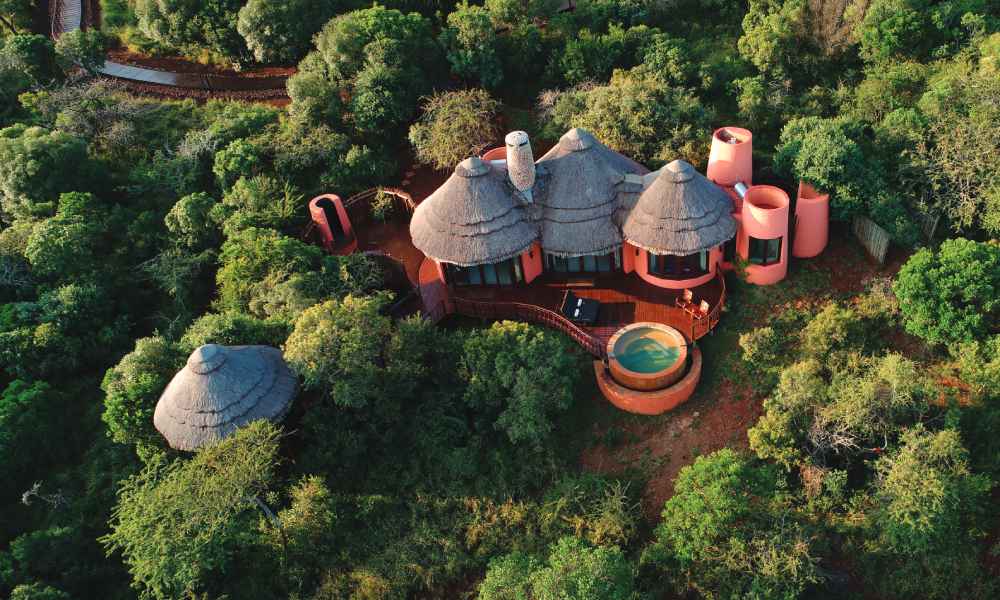

Thanda Safari Lodge, Bush Suite (Photo by Thanda Safari)
Being a luxury lodge and private game reserve, you’ll never see more than two safari vehicles touring Thanda at the same time, so you will truly enjoy full reign over the landscape. Their early morning drives starts at dusk and welcomes the rising sun, while the afternoon drives see its retreat, filling the sky with the warm sundowner hues that so moved me that first night in Johannesburg. Except here, there are no buildings to offset their majesty. We are, for all practical purposes, communing in the wild with nature as it slowly dims its magic for the night. Back at the lodge, I stay in my own free-standing suite with a bathtub that rivals many small ponds, and a private plunge pool in the back, overlooking the wilderness. Once you retreat to your home after dinner, however, leaving your “bush suite” is forbidden. Unless you volunteer as the dessert course to your new animal friends.
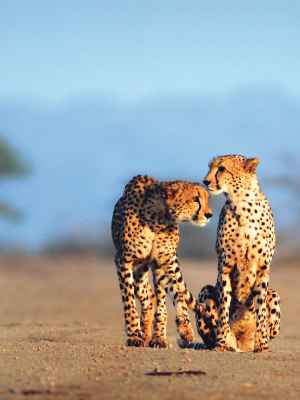

Beyond the wildlife, the culture of the area’s Zulu people plays a prominent role at Thanda. About 75% of those working at the lodge are members of the local Zulu community and cultural interactions are part of what make the Thanda experience so unique. During dinner, a group of women from a nearby village perform, with words and movements that are not familiar to me, but voices so beautiful and unified that it is hard not to be swayed by the sounds.
The next day Thanda arranges a visit to a Zulu village, where I have an opportunity to meet and talk with an elder Zulu couple in their home, surrounded by their five grandchildren. As we discuss our day-to-day lives, the conversation turns to familial practices in the Zulu culture. Ten cows are the traditional dowry required for a wife, though they now accept equivalent currencies. Multiple wives are allowed, but divorce does not exist within their culture, so their family structure is truly till death do them part.
I ask our interpreter, Ziggy, who is a Zulu man in his (probably) 20s, how the culture deals with a same-sex couple. After all, South Africa was the fifth country to legalize same-sex marriage in 2006 (Americans didn’t win that right until 2015). He explains it happens, though it’s a relatively new introduction into the culture. The most complicated aspect, he assures me, is who pays the dowry.
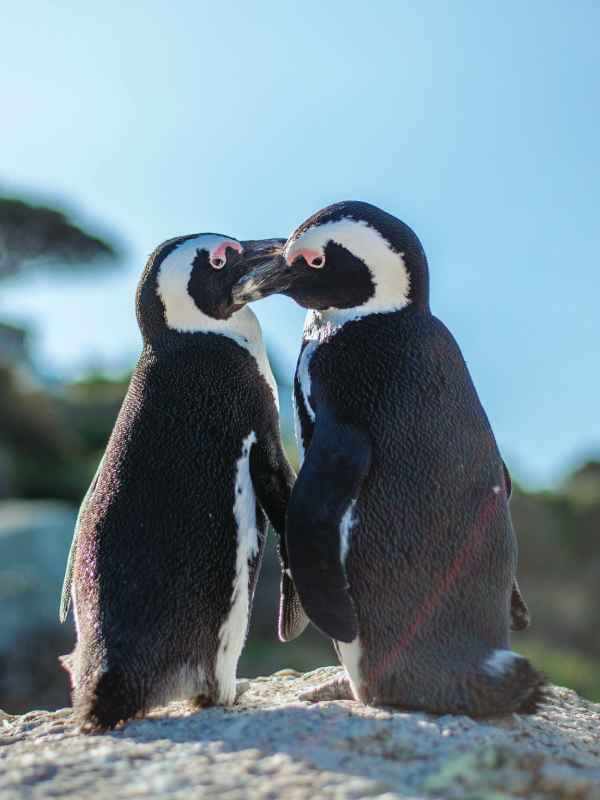

African Penguins at Boulders Beach (Photo by Cape Town Tourism)
CAPE TOWN
Having failed to pack the appropriate livestock to secure a Zulu husband, I set out to Cape Town the next day. Cape Town is undoubtedly the LGBTQ+ capital of the African continent. From nightlife to nature, from world-class accommodations to internationally recognized vineyards, if you want it, Cape Town has it.
The physical beauty of the city is breathtaking, and there is no better way to experience it than from above. My first activity upon arrival is the Three Bays Tour with NAC Helicopters (East Pier Rd, Waterfront. Tel: +27-21-425-3868. nachelicopterscapetown.com), which glides you along the coasts, over the city center, and by Table Mountain and her beautiful “side table” sister mountains (I may have made up that term). Do yourself a favor and book one of NAC Helicopter’s adventures. That experience alone had me high on Cape Town for days (figuratively…literally the tour was about 25 minutes). NAC also has a variety of options, both shorter and longer, and is surprisingly affordable, starting at around $85.
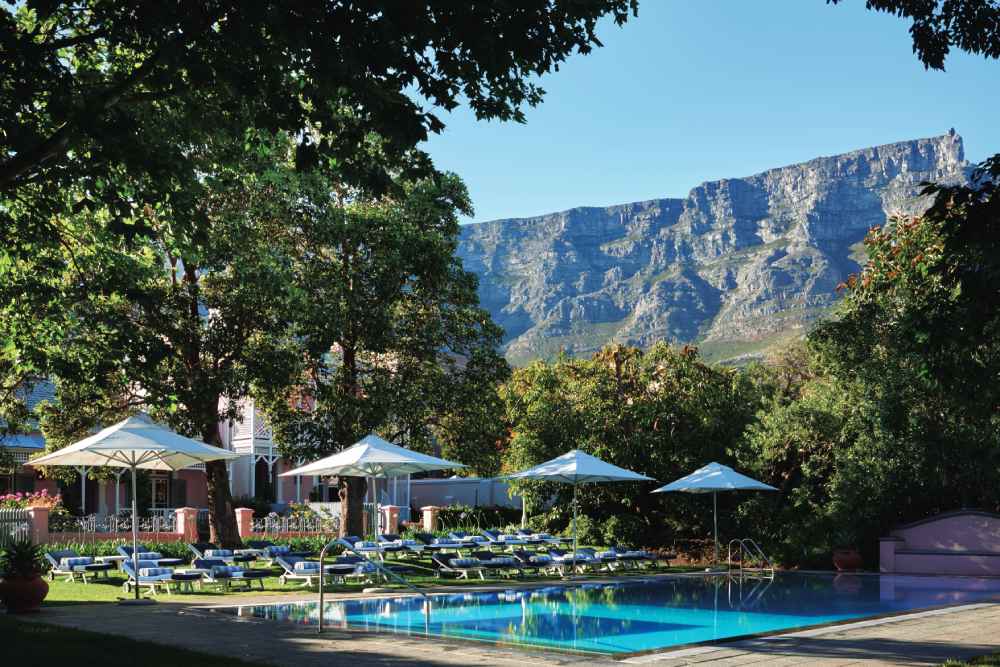

Belmond Mount Nelson Hotel (Photo by Belmond Mount Nelson Hotel)
Back on the ground, it’s time to check-in to my ridiculously luxurious home at the Belmond Mount Nelson Hotel (76 Orange St. Tel: +27-21-483-1000. belmond.com/mountnelson). Nicknamed “The Nellie” and celebrated for its pastel pink painted walls, the Mount Nelson is a gay man’s dream. From my outdoor terrace, I enjoy unencumbered views of Table Mountain. Inside, the antique furnishings include an upright piano. Now, I don’t play piano, but I sure as hell can appreciate its company. Opened in 1899, The Nellie has two pools, a spa, perfectly manicured gardens, and all the five-star luxury you can handle. You really can’t go wrong with any of their room options, but if you’d like to host a piano recital you may want to consider room 672.
Cape Town is also less than an hour away from both the Stellenbosch and Franschhoek wine regions, both gorgeous and hilly and home to luxury estates and world-class wines. In Franschhoek, I board the Franschhoek Wine Tram (Tel: +27-21-300-0338. winetram.co.za) for a hop-on-hop-off experience, free of driving worries. The vintage trams roll on eight different tracks, each with its own selected wineries. And yes, sips are available on board.
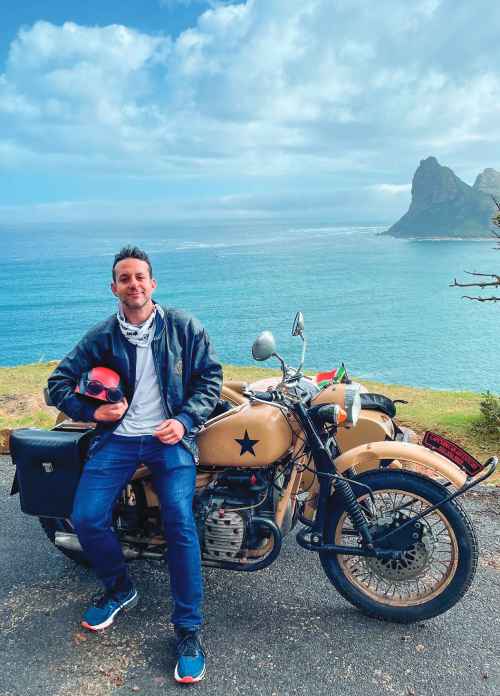

Cape Sidecar Adventures (Photo by Ivan Quintanilla)
Back in Cape Town and missing my safari friends I decide on a different type of animal fix: the African Penguins of Boulders Beach. With scientifically documented homosexual relationships in several zoos throughout the world, I feel it’s only appropriate that I visit my (potentially gay) penguin family in grand style: riding a vintage sidecar motorcycle. The Cape Sidecar Adventures’ (Tel: +27-21-434-9855. www.sidecars.co.za) fleet of decommissioned 1950s military bikes are immaculate, and their half-day tour seats you comfortably in the sidecar and drives you down Cape Town’s spectacular coast. They will pick you up at your hotel, dress you in a leather jacket and vintage helmet, and inspire all your biker/greaser fantasies; my bike was even named Sandy!
Seeking a shift from classy to sassy, I move into the Radisson RED Cape Town (Silo 6, Silo Sq. Tel: +27-87-086-1578. radissonhotels.com) on the Victoria & Alfred (V&A) Waterfront. With my complimentary check-in cocktail in-hand, I realize the Radisson RED is the perfect spot from which to explore the shopping and nightlife of the V&A neighborhood, the most visited area on the entire African continent. The hotel has an artsy vibe, serves popcorn 24-hours a day, and parties with a rooftop bar and pool that are a destination unto themselves.
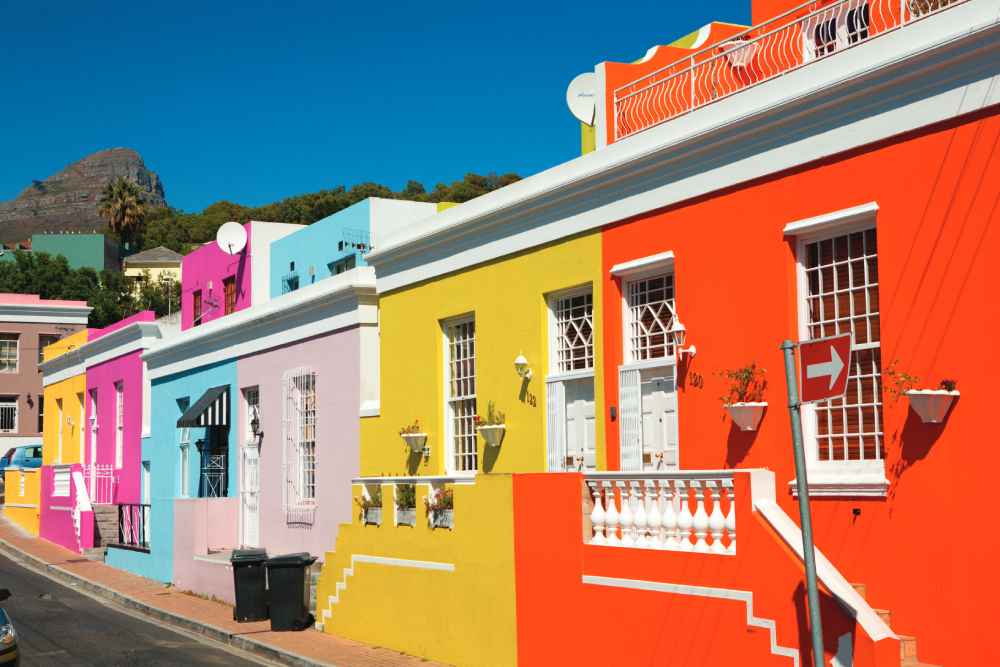

Bo-Kaap (Photo by Cape Town Tourism)
Culturally, Cape Town thrives on South Africa’s diversity. The Bo-Kaap neighborhood, with its colorful buildings, is home to the Cape Malay people, a culture unique to Cape Town. Originally from Indonesia, Malaysia, and other areas of the East Indian archipelago, these enslaved people were brought to Cape Town in the 1600’s. Primarily of Muslim faith, they established South Africa’s first mosque (in Bo-Kaap) and today continue a rich culture with its own cuisine. For a personal perspective, I join Halaal Hopper (halaalhopper.co.za) for a historical walking tour of Bo-Kaap, ending with a Cape Malay meal in the home of a Bo-Kaap family. Beyond delicious, with this culinary gateway I learn a history not often taught in the U.S., and one that enriches the tapestry of South African culture.
Our LGBTQ+ community also plays prominently in the cultural landscape of Cape Town. Though some beloved nightlife spots have closed post COVID lockdowns, the city is welcoming throughout, and very mixed (even at LGBTQ-identifying spots). I begin most nights with cocktails at Cafe Manhattan (74 Waterkant St. Tel: +27-21-421-6666. manhattan.co.za) in the De Waterkant gayborhood. From there it’s time for Beefcakes (40 Somerset Rd. Tel: +27-21-425-9019. beefcakes.co.za) for a night that includes burgers, drag performances, adorable waiters, and–should you choose (I did!), body shots off said waiters naked torsos.
On weekend nights the dancing options include the Pink Candy Night Club (120 Strand St. Tel: +27-82-332-9051. instagram.com/pinkcandynightclub), with its mixed gay-straight clientele, and Zer021 Rooftop (36 Canterbury St. Tel: +27-71-760-3178. zer021.co.za), the LGBTQ+ bar that presents itself as “the true Cape Town bar for the urban tomorrow!” From my experience, Zer021 is the most diverse in both population and gender expression, but I feel welcomed at all my nightlife stops.
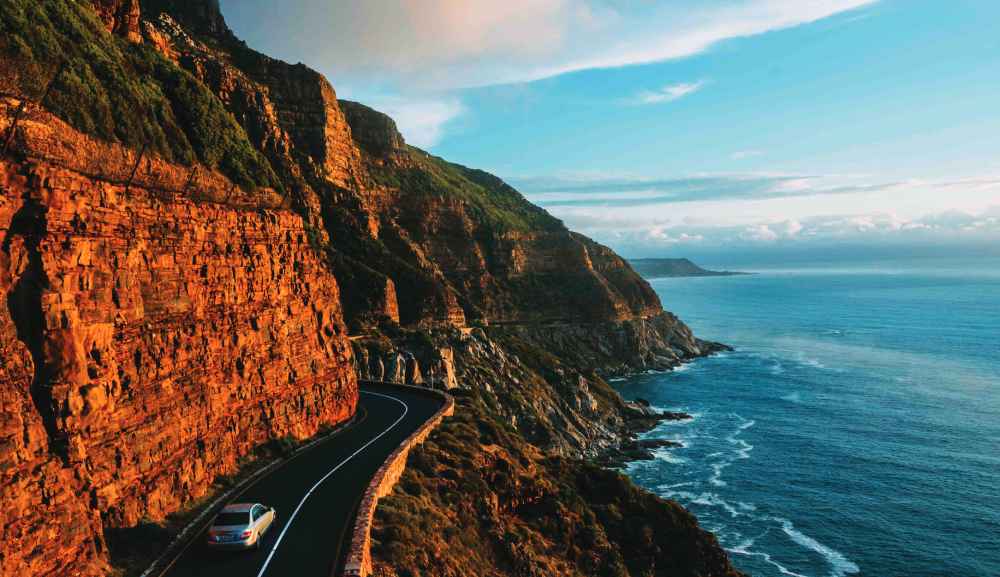

Chapmans Peak Drive (Photo by Cape Town Tourism)
We all talk about bucket list items and once-in-a-lifetime trips. South Africa is both of these things, and I seriously hope this experience is one I’m able to repeat. I’d heard about Cape Town as a “gay hotspot,” but I knew embarrassingly little about the complex and multicultural history of South Africa, and I’ve only scratched the surface of learning what this country has to teach. Though its history of racial strife is long and brutal, and still prevalent in South Africa’s present iteration, I feel hopeful of the progress the country has made in the last few decades. I feel honored to have witnessed the South African people’s determination to work toward a more unified population, and I feel grateful that the people here value the richness and diversity of each individual, as well as their collective heritage.
You May Also Enjoy
Exploring The Rainbow Nation
Johannesburg: Tearing Down Walls and Building a New South Africa
Johannesburg–Tearing Down Walls and Building a New South Africa


